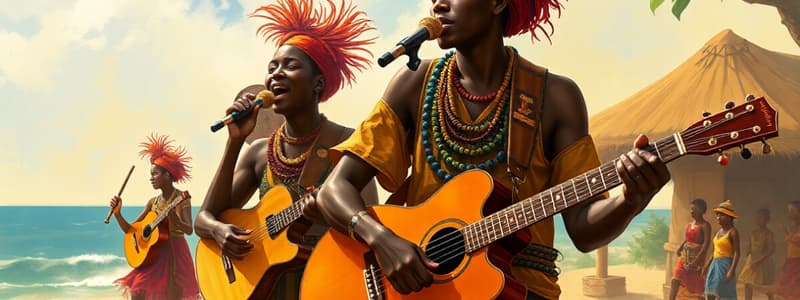Podcast
Questions and Answers
What distinguishes West African Griots from other musicians in Africa?
What distinguishes West African Griots from other musicians in Africa?
- Their role as keepers of tribal history and tradition. (correct)
- Their creation of instruments like the Marimba.
- Their participation in public festivals and celebrations.
- Their use of polyrhythms in their music.
Which statement best describes Berber music?
Which statement best describes Berber music?
- Music played on a 21-string harp lute called a kora.
- Songs following a call-and-response pattern centered around family life.
- Music played at festivals, often featuring drums, pipes, and strings. (correct)
- Primarily vocal music focused on bravery and hunting.
Why is Queen Marimba considered a significant figure in African music?
Why is Queen Marimba considered a significant figure in African music?
- She is credited with popularizing music and creating instruments. (correct)
- She invented polyrhythms.
- She preserved tribal history through storytelling.
- She led a nomadic lifestyle and developed vocal music traditions.
Which musical practice is common across many African musical traditions?
Which musical practice is common across many African musical traditions?
How does Maasai music differ from the music of West African Griots?
How does Maasai music differ from the music of West African Griots?
What is the kora?
What is the kora?
What are the primary themes of Maasai men's songs?
What are the primary themes of Maasai men's songs?
What is a defining characteristic of Maasai music?
What is a defining characteristic of Maasai music?
Flashcards
Polyrhythms
Polyrhythms
Rhythmic patterns that combine multiple contrasting rhythms in music.
West African Griots
West African Griots
Skilled musicians and storytellers who preserve ancestral history through music.
Kora
Kora
A 21-string harp lute played by West African griots.
Queen Marimba
Queen Marimba
Signup and view all the flashcards
Berber Bands
Berber Bands
Signup and view all the flashcards
Kenyan Maasai Singing
Kenyan Maasai Singing
Signup and view all the flashcards
Call-and-Response
Call-and-Response
Signup and view all the flashcards
Folk Heroes
Folk Heroes
Signup and view all the flashcards
Study Notes
Sounds of Africa
- Early African music developed across many tribes and countries.
- Modern-day African music shows how ancient music evolved over time.
- Polyrhythms, an interweaving of different rhythmic patterns, feature in many.
West African Griots
- Skilled musicians and storytellers.
- Travel between villages in West Africa.
- Preserve tribal history, events, and traditions through songs and stories.
- An important role in societies with little written history.
- Perform with harps (kora).
Berber Bands of North Africa
- Indigenous to North Africa.
- Music varies regionally.
- Often performed by drummers and musicians playing pipes/stringed instruments.
- Many bands perform together at festivals.
Kenyan Maasai Singing
- Nomadic people in Kenya and Tanzania.
- Instruments are not essential to their music.
- Their vocal music uses a call-and-response pattern.
- Men sing about bravery and hunting, women about family.
Studying That Suits You
Use AI to generate personalized quizzes and flashcards to suit your learning preferences.



